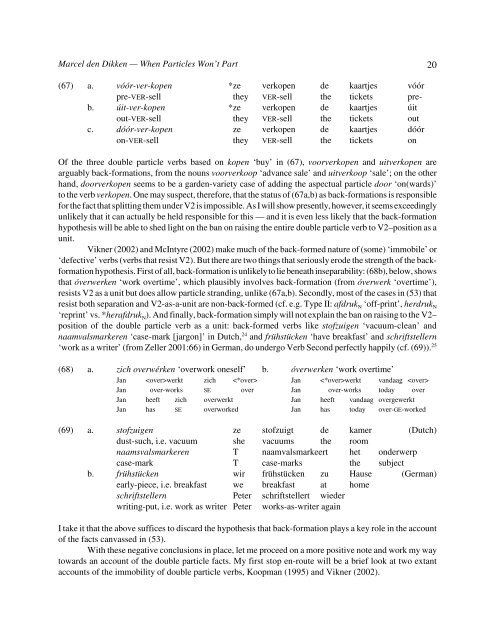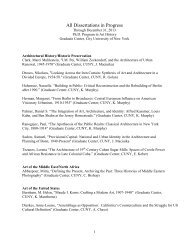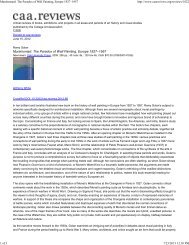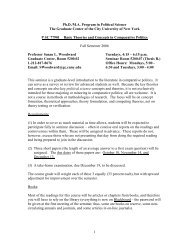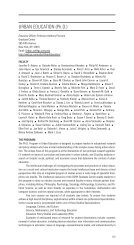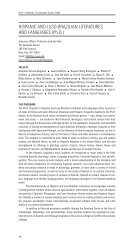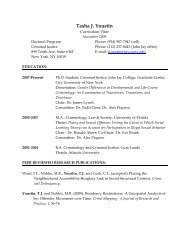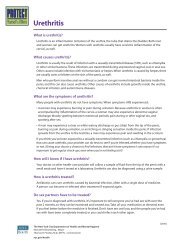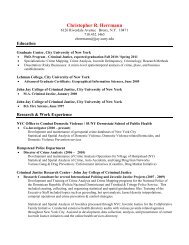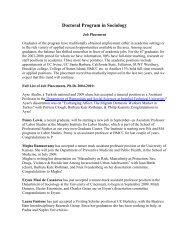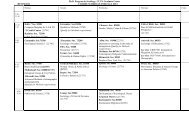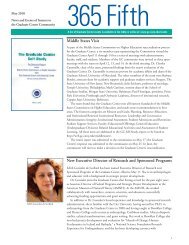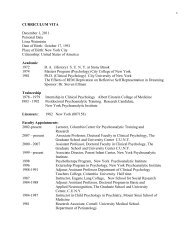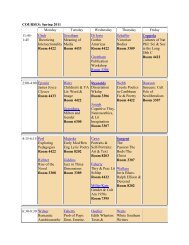When Particles Won't Part - CUNY Graduate Center
When Particles Won't Part - CUNY Graduate Center
When Particles Won't Part - CUNY Graduate Center
You also want an ePaper? Increase the reach of your titles
YUMPU automatically turns print PDFs into web optimized ePapers that Google loves.
Marcel den Dikken — <strong>When</strong> <strong><strong>Part</strong>icles</strong> Won’t <strong>Part</strong><br />
(67) a. vóór-ver-kopen *ze verkopen de kaartjes vóór<br />
pre-VER-sell they VER-sell the tickets preb.<br />
úit-ver-kopen *ze verkopen de kaartjes úit<br />
out-VER-sell they VER-sell the tickets out<br />
c. dóór-ver-kopen ze verkopen de kaartjes dóór<br />
on-VER-sell they VER-sell the tickets on<br />
Of the three double particle verbs based on kopen ‘buy’ in (67), voorverkopen and uitverkopen are<br />
arguably back-formations, from the nouns voorverkoop ‘advance sale’ and uitverkoop ‘sale’ ; on the other<br />
hand, doorverkopen seems to be a garden-variety case of adding the aspectual particle door ‘on(wards)’<br />
to the verb verkopen. One may suspect, therefore, that the status of (67a,b) as back-formations is responsible<br />
for the fact that splitting them under V2 is impossible. As I will show presently, however, it seems exceedingly<br />
unlikely that it can actually be held responsible for this — and it is even less likely that the back-formation<br />
hypothesis will be able to shed light on the ban on raising the entire double particle verb to V2–position as a<br />
unit.<br />
Vikner (2002) and McIntyre (2002) make much of the back-formed nature of (some) ‘immobile’ or<br />
‘defective’ verbs (verbs that resist V2). But there are two things that seriously erode the strength of the backformation<br />
hypothesis. First of all, back-formation is unlikely to lie beneath inseparability: (68b), below, shows<br />
that óverwerken ‘work overtime’ , which plausibly involves back-formation (from óverwerk ‘overtime’ ),<br />
resists V2 as a unit but does allow particle stranding, unlike (67a,b). Secondly, most of the cases in (53) that<br />
resist both separation and V2-as-a-unit are non-back-formed (cf. e.g. Type II: afdruk N ‘off-print’ , herdruk N<br />
‘reprint’ vs. *herafdruk N). And finally, back-formation simply will not explain the ban on raising to the V2–<br />
position of the double particle verb as a unit: back-formed verbs like stofzuigen ‘vacuum-clean’ and<br />
naamvalsmarkeren ‘case-mark [jargon]’ in Dutch, 24 and frühstücken ‘have breakfast’ and schriftstellern<br />
‘work as a writer’ (from Zeller 2001:66) in German, do undergo Verb Second perfectly happily (cf. (69)). 25<br />
(68) a. zich overwérken ‘overwork oneself’ b. óverwerken ‘work overtime’<br />
Jan werkt zich Jan werkt vandaag <br />
Jan over-works SE over Jan over-works today over<br />
Jan heeft zich overwerkt Jan heeft vandaag overgewerkt<br />
Jan has SE overworked Jan has today over-GE-worked<br />
(69) a. stofzuigen ze stofzuigt de kamer (Dutch)<br />
dust-such, i.e. vacuum she vacuums the room<br />
naamsvalsmarkeren T naamvalsmarkeert het onderwerp<br />
case-mark T case-marks the subject<br />
b. frühstücken wir frühstücken zu Hause (German)<br />
early-piece, i.e. breakfast we breakfast at home<br />
schriftstellern Peter schriftstellert wieder<br />
writing-put, i.e. work as writer Peter works-as-writer again<br />
I take it that the above suffices to discard the hypothesis that back-formation plays a key role in the account<br />
of the facts canvassed in (53).<br />
With these negative conclusions in place, let me proceed on a more positive note and work my way<br />
towards an account of the double particle facts. My first stop en-route will be a brief look at two extant<br />
accounts of the immobility of double particle verbs, Koopman (1995) and Vikner (2002).<br />
20


